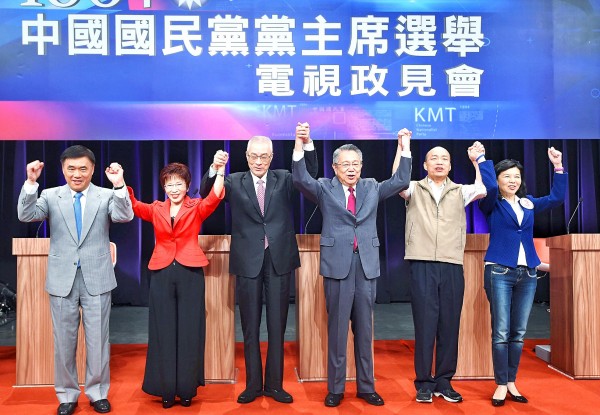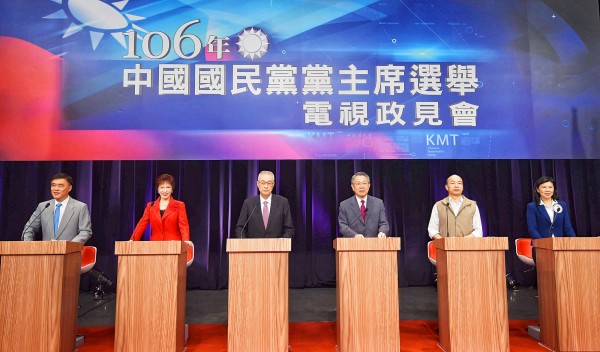《TAIPEI TIMES 焦點》 KMT chair candidates exchange barbs

The six candidates for Chinese Nationalist Party chairperson join hands before a televised debate in Taipei yesterday. Photo: Fang Pin-chao, Taipei Times
KMT ELITES: In an apparent swipe at Wu Den-yih, Hung Hsiu-chu said she wondered why some of the party’s best politicians lost their seats in last year’s legislative elections
By Alison Hsiao / Staff reporter
The six Chinese Nationalist Party (KMT) chairperson candidates yesterday held their second and final political platform presentation, with former vice president Wu Den-yih (吳敦義), whom a media poll puts in front, fielding challenges from his two closest rivals.
Although the event was intended to be a presentation rather than a debate, KMT chairwoman Hung Hsiu-chu (洪秀柱) and vice chairman Hau Lung-bing (郝龍斌) needled Wu with questions concerning his national identity and ability to unite the party, respectively.
Hung, citing former president Chiang Ching-kuo’s (蔣經國) oft-quoted remark that he was “a Taiwanese and also a Chinese [zhong guo ren, 中國人],” and said that she endorsed that sentiment and that Wu, “as a pupil of Chiang’s,” should also agree with it.
“If ‘being Taiwanese is not being zhong guo ren’ was the mainstream belief in society, would you give up what Chiang Ching-kuo upheld?” Hung asked.
She also criticized a proposal — once rumored to be endorsed by Wu, who later called the rumor an attempt to vilify him — to rename the KMT the “Taiwan Nationalist Party.”
Deflecting Hung’s question about national identity, Wu said: “My academic background is in history, so I know that without Chiang Kai-shek’s (蔣介石) lead, the Republic of China [ROC] could not have won the war of resistance against Japan, without which there would not have been the glorious retrocession of Taiwan, without which [Sun Yat-sen’s, 孫逸仙] Three Principles of the People could not have been realized in Taiwan.”
He added that he opposes the “de-Chiang [Kai-shek] and de-ROC movements” and supports “one China, different interpretations.”
Hau questioned Wu’s resolution to unite the party and back military personnel, civil servants and public teachers against the Democratic Progressive Party (DPP) government’s “unjust policies.”
Wu said he has visited and offered assistance to protesters outside the Legislative Yuan.
He also cited his experience as a political veteran, saying it proves he can relate to and win the support of all.
In an apparent swipe at Wu, Hung said she wondered why some of the party’s best politicians lost their seats in last year’s legislative elections.
“During its eight years in office, the party failed to train and cultivate [the next generation of leaders] and kept falling over; the party elite at that time should be held accountable by the party’s supporters,” she said.
All candidates said the DPP administration had failed to boost the economy, polarized society and promulgated failed policies such as the “one fixed day off and one flexible rest day” and the Forward-looking Infrastructure Development Program.
Former KMT legislator Pan Wei-kang (潘維剛) referred to herself as “the only mother among the six candidates” and said that Taiwanese mothers have been unhappy since the DPP took over and feel apprehensive about their children’s futures.
Former KMT vice chairman Steve Chan (詹啟賢) and former Taipei Agricultural Products Marketing Corp president Han Kuo-yu (韓國瑜) tried to appeal to KMT members by touting themselves as outside the establishment and thus offering the party a fresh image.
They also proposed more inter-party operation between the pan-green and pan-blue camps.
“I propose that the KMT supports the DPP’s policies if they are good, and endorses their candidates in the upcoming elections, if they have excelled in their jobs, as Hsinchu Mayor Lin Chih-chien (林智堅) has,” Han said.
He said the KMT’s main difference from the DPP is that it does not support formal independence, which he compared to syphilis.
One way to reform the KMT is to “dump the old concepts and accommodate the mainstream view,” Chan said.
A party chairperson must want to win support across party lines and win the trust of non-affiliated voters, Chan said, criticizing the party for forgetting its core strength, the “middle way.”
The party is to hold the election on May 20.
新聞來源:TAIPEI TIMES

The six candidates for Chinese Nationalist Party chairperson prepare for a televised debate in Taipei yesterday. Photo: Fang Pin-chao, Taipei Times

















